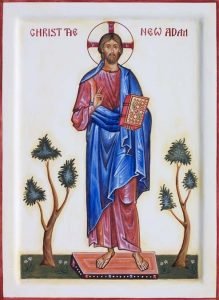 Central to the Christology endorsed by the early councils was the vision of Christ as both the eternal Logos and the “New Adam,” who established the unity of humanity with himself as the divine model according to whose image human beings were created in the beginning. However this process could not be automatic or magical: it required free human response to the Spirit and the cooperation of each human person and a “gathering” of free believers within the assembly of the Church. Free response to God’s invitation is absolutely essential. The “whole Christ” was manifested where two or three were gathered in his name and where, therefore, the Pauline image of the Body could be concretely present. Indeed, that “Body” is the Church realized most fully in the Eucharist.
Central to the Christology endorsed by the early councils was the vision of Christ as both the eternal Logos and the “New Adam,” who established the unity of humanity with himself as the divine model according to whose image human beings were created in the beginning. However this process could not be automatic or magical: it required free human response to the Spirit and the cooperation of each human person and a “gathering” of free believers within the assembly of the Church. Free response to God’s invitation is absolutely essential. The “whole Christ” was manifested where two or three were gathered in his name and where, therefore, the Pauline image of the Body could be concretely present. Indeed, that “Body” is the Church realized most fully in the Eucharist.
Participation in the Eucharist was defined in Christological terms: it was a participation in the resurrected and glorified humanity of Christ, assumed in the hypostasis (or Person) of the Son of God and penetrated with divine life. Since, in Christ, there was no confusion of essences or natures, neither were “those in Christ’ partaking of the “essence” of God, but of his human nature.
Being “in Christ”, therefore, does not involve person or “hypostatic” identification with the Logos, because the person is that which is always unique. It involves a sharing, through the power of the Spirit, in Christ’s glorified humanity – a humanity that remains fully human.
We are called to be like the New Adam, that is Jesus. He represents all that God intended when He created humanity. By now I know that all of my readers already know what type of person Jesus was and is. He is a person who extends unconditional love and acceptance to all others and is not self-centered but other-centered. He showed us that the purpose of this earthly existence is to learn how to be a ”spiritual” human being who knows that life is given to him/her to grow in the likeness of Jesus, the model of what humans should be like if they want to gain the fullness of life. The process, however, requires that we humans freely give ourselves to the task of “becoming like Jesus”. There is no other reason why we are here. We are here to cooperate with God’s help to become the true human beings He created us to be.
